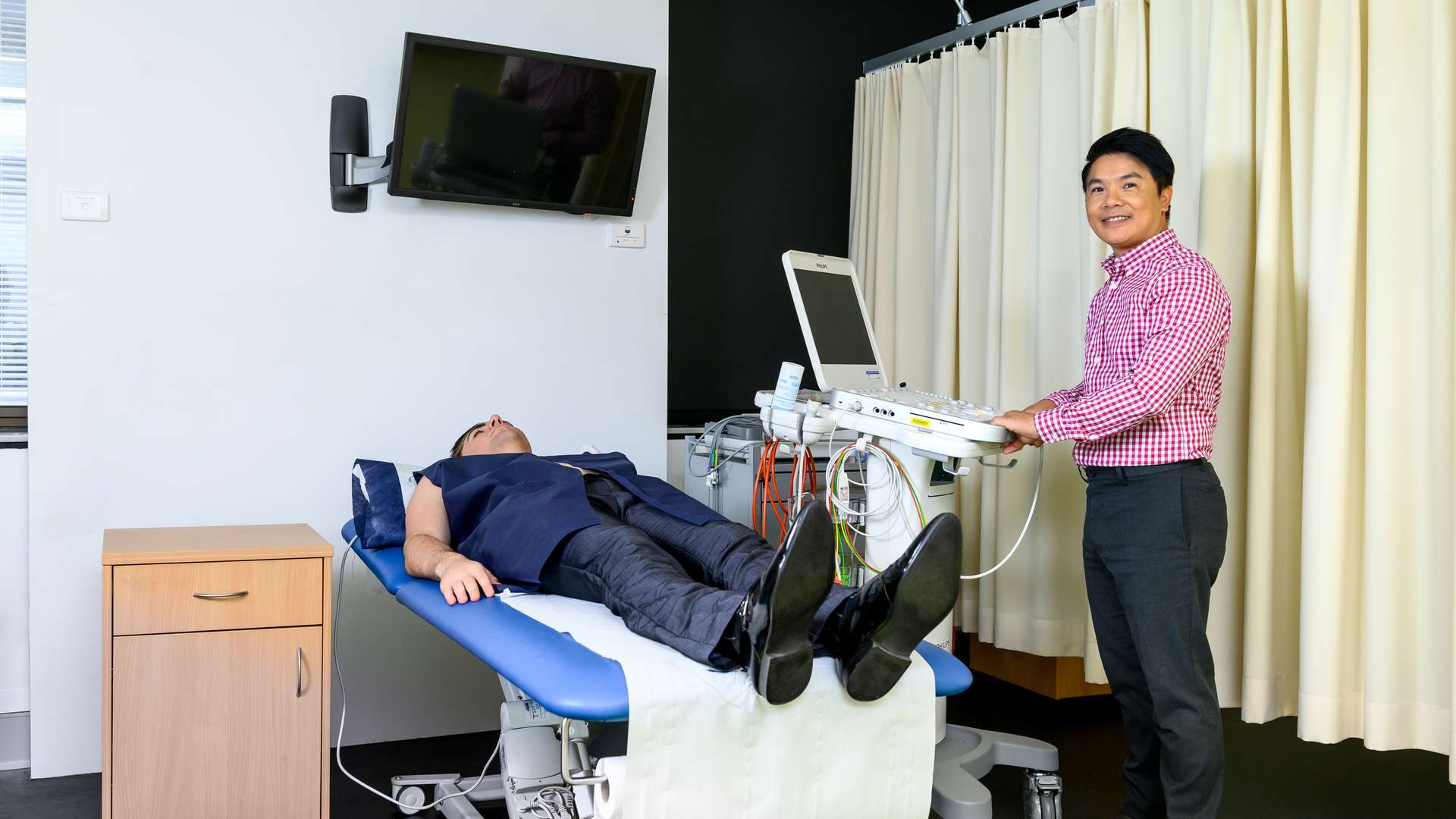Bachelor of Echocardiography and Cardiac Physiology / Graduate Diploma of Echocardiography

Overview
Enjoy the opportunity to join a niche medical profession with no prior degree in health sciences. The Bachelor of Echocardiography and Cardiac Physiology/Graduate Diploma in Echocardiography is the first Australian course allowing undergraduate entry to this growing field within diagnostic medical imaging.
An Echocardiographer (or cardiac sonographer) is a health professional who uses a range of diagnostic tools, including ultrasonic equipment, to produce diagnostic images, video loops, laboratory data and three dimensional and four-dimensional volumes of cardiovascular anatomy.
You will undertake a four-year full-time course of study, comprising a three-year undergraduate Bachelor of Echocardiography (Cardiac Physiology) and a one-year Graduate Diploma of Echocardiography.
You will be able to apply your knowledge of cardiac physiology, measurement science and practical echocardiographic scanning skills in the diagnostic setting.
Why choose Echocardiography at CQUni?
- Australia's only combined undergraduate/postgraduate course
- Fully competent to perform full cardiac assessment including echocardiography
- Extensive clinical experience, placed by CQUniversity
- State of the art, purpose-built training environments for real-world simulation
- Global accreditation - students will be eligible to seek registration as Echocardiographers within Australia, Europe, Britain and the United States of America
 “
“I would love to work in a hospital or practice as a cardiac sonographer – I love the patient interaction. And hopefully someday, when I have enough experience, I would love to open up my own practice.
Sonam Jalota
Bachelor of Echocardiography (Cardiac Physiology) / Graduate Diploma of Echocardiography
Career Opportunities
The Bachelor of Echocardiography (Cardiac Physiology) and Graduate Diploma of Echocardiography prepares you to practise as an Echocardiographer.
Employment opportunities may exist in organisations such as:
- public and private hospitals
- community health care services.
Echocardiographers are highly specialised health professionals, who require specialised education and skills to view, analyse, modify and provisionally report on cardiac scans. An echocardiographer has an important degree of responsibility within the diagnostic process and often work closely with surgical staff.
Echocardiographers are in demand in many public and private health facilities, and this demand is likely to grow due to the aging population.
Australian Sonographers and Echocardiographers are well regarded globally and there are strong employment opportunities if you are looking to travel and work overseas.
Structure & Availability
The course structure and available locations can change depending on when you want to study. You can choose the intake that best suits you in the drop-down menu below.
Available Locations
How You'll Study
The course is structured so that Year One is delivered online, with on-campus attendance required for scheduled residential schools. These residential schools must be attended at your campus of admission. Units with residential schools are marked in the unit list below.
From Years 1 to 3, you'll complete practical learning in the clinical simulation echocardiography and computer laboratories on campus during Terms 1 and 2.
You'll study on campus in Years 2 and 3 (except for Term 2 in Year 3), and compulsory weekly lab attendance is required.
You must attend all laboratory, residential school and intensive workshop activities at your campus of admission. You will be required to prepare for financial costs associated with any travel and other associated costs involved with attending residential schools, laboratory sessions or workshops.
Your Course
You must complete 23 units (192 credits):
- 1The core structure (23 units)
Unit Details
The units you'll study are listed below. Click on a unit to learn more.
Course Planner
To help you plan your studies and see which unit comes first, if one unit should be completed before another and when you will study each unit, check out our course planners.
Additional Information
Professional Practice - Australasian Sonographer Accreditation Registry (ASAR)
Core
The CV69 Bachelor of Echocardiography and Cardiac Physiology / Graduate Diploma of Echocardiography has been accredited by the Australasian Sonographer Accreditation Registry (ASAR). Students must complete both the Bachelor of Echocardiography and Cardiac Physiology and the Graduate Diploma of Echocardiography to gain accreditation.The external accreditation body sets a MAXIMUM time that individuals may be on the ASAR Registry as a Student of 5 years from the date of initial entry onto the registry. Students must register as an Accredited Student Sonographer with ASAR during year 2 of CV69 course enrolment, prior to their first clinical practicum. This requirement means that students must complete this course of study within 5 years of their student registration date in order to qualify as an accredited Echocardiographer.
Cardiac Clinical Unit 3 - ECHO13007
640 hours of clinical placement. Students perform a broad range of echocardiographic studies under the direct supervision of a qualified cardiac sonographer, or delegate. Student learning is supported on-site by the clinical supervisor, in-conjunction with support from the CQUniversity academic unit coordinator. Clinical facilities can often only host one student at a time so the placement locations are spread over a large geographical area. As a result prospective students are advised that they should prepare personally and financially to relocate for some or all of their placement.
Cardiac Clinical Unit 2 - ECHO12005
320 hours of clinical placement. Students perform a broad range of cardiac physiology and echocardiographic studies under the direct supervision of a qualified cardiac sonographer, or delegate. Student learning is supported on-site by the clinical supervisor, in-conjunction with support from the CQUniversity academic unit coordinator. Clinical facilities can often only host a small number of students at a time so the placement locations are spread over a large geographical area. As a result prospective students are advised that they should prepare personally and financially to relocate for some or all of their placement.
Cardiac Clinical Unit 5 - ECHO20005
640 hours of clinical placement. Progressing to independent practice in preparation for entry to professional practice, students perform a broad range of echocardiographic studies under the direct supervision of a qualified cardiac sonographer, or delegate. Student learning is supported on-site by the clinical supervisor, in-conjunction with support from the CQUniversity academic unit coordinator. Clinical facilities can often only host one student at a time so the placement locations are spread over a large geographical area. As a result prospective students are advised that they should prepare personally and financially to relocate for some or all of their placement.
Cardiac Clinical Unit 4 - ECHO20004
640 hours of clinical placement. Students perform a broad range of echocardiographic studies under the direct supervision of a qualified cardiac sonographer, or delegate. Student learning is supported on-site by the clinical supervisor, in-conjunction with support from the CQUniversity academic unit coordinator. Clinical facilities can often only host one student at a time so the placement locations are spread over a large geographical area. As a result prospective students are advised that they should prepare personally and financially to relocate for some or all of their placement.
If you have completed prior study relevant to units within this course, you may be eligible for credit for your past studies. Learn more about credit and recognition of prior learning.
Requirements
To Be Eligible
For your application to be considered, you must meet the following entry requirements.
Student and Course Profiles
View the student and course profiles for this course and learn about CQU's Undergraduate Profile for Term 1, 2024 via our Institute Profile.
During Your Study
While not needed to apply, you'll need to meet the following requirements throughout your studies.
Fees & Scholarships
Indicative First-Year Fee
The Indicative First-Year Fee is the approximate cost of enrolling in this course for one full-time academic year (eight units over two terms) for a Commonwealth Supported Place (CSP) and should be used as a guide only. Your actual fees may vary, depending on the units you select to study and your study load. Check the cost-per-unit spreadsheet available on our fees webpage for the approved unit fees. Fees are reviewed each year and are subject to change. Understanding your fees.
Commonwealth Supported Places
This course has Commonwealth Supported Places (CSPs) available, and as a domestic student, you'll be offered a CSP, provided you meet CSP eligibility requirements. CSPs are subsidised by the Australian Government, meaning you are only required to pay the student contribution rather than full tuition fees.
HECS-HELP Loan
You may be eligible for a HECS-HELP government loan if you are offered a CSP. HECS-HELP is an Australian Government loan scheme that assists you in paying your student contributions. Provided you meet the HECS-HELP eligibility criteria, you may use HECS-HELP to defer part or all of your student contribution fees.
Part of your course costs will include Student Services and Amenities Fees (SSAF). SSAF is charged in addition to your student contribution or tuition fees and is used to help enhance your study experience. There may also be other costs as part of your studies, such as textbooks, technology expenses, travel expenses, professional certifications, uniforms, or vaccinations. Explore other study costs.
We believe a quality education can be for everyone – regardless of background, location, or life circumstances. That's why we offer a variety of scholarships and bursaries that can give you a helping hand with a range of expenses and enhance your employability.
How to Apply
How to Apply
Select where you'd like to study and your preferred intake
You'll need to choose where you would like to study in the 'choose where you live' selector. This course is only available on campus, so not all states or territories will be listed.
Your Application Options
Follow These Steps
Extra Admission Information
Prior to applying, take a look at important application dates and learn about our admission considerations, such as information for domestic students with overseas qualifications, indigenous support, and elite athlete, coach and performer support. You should also check out the adjustment schemes that might be available to you and how to access them. You can also explore our offer information to learn more about what happens after you've submitted an application and how to respond to an offer to study with CQU.
Applying for 2026
Applications for 2026 via the Queensland Tertiary Admission Centre (QTAC) open in August 2025.
More information will be available soon.
